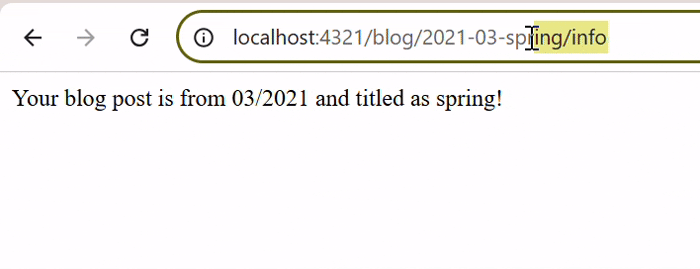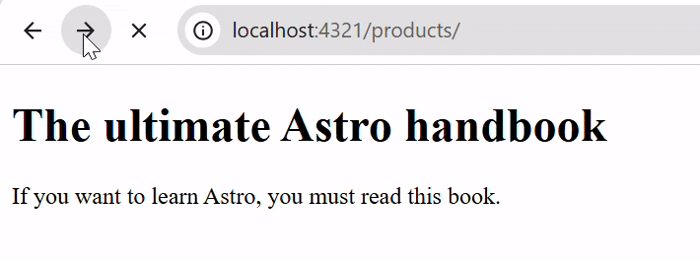
- Astro JS Tutorial
- Astro JS - Home
- Astro JS - Overview
- Astro JS vs Next JS
- Astro JS vs React JS
- Astro JS Setup
- Astro JS - Installation
- Astro JS - Project Structure
- Astro JS - Pages
- Astro JS Architecture
- Astro JS - Islands
- Astro JS - Islands Architecture
- Astro JS Routing
- Astro JS - Routing
- Astro JS - Dynamic Routing
- Astro JS - Redirecting Routes
- Astro JS - i18n Routing
- Astro JS Configuration
- Astro JS - Configuration
- Astro JS - Editor Setup
- Astro JS - TypeScript Configuration
- Astro JS - Environment Variables
- Astro JS Build UI
- Astro JS - Components
- Astro JS - Slots
- Astro JS - Layouts
- Astro JS - Fonts
- Astro JS - Scripts
- Astro JS Create Website
- Astro JS - Markdown Contents
- Astro JS - Add Images
- Astro JS - Manage Content
- Astro JS - Content Collections
- Astro JS - Data Fetching
- Astro JS Styling and CSS
- Astro JS - Styling
- Astro JS - CSS Integration
- Astro JS - CSS Cascading Order
- Astro JS Integrations
- Astro JS - React Integrations
- Astro JS - Svelte Integrations
- Astro JS - Solid Integrations
- Astro JS - Vue Integrations
- Astro JS Adapters
- Astro JS - Netlify Adapter
- Astro JS - Cloudflare Adapter
- Astro JS Testing and Deployment
- Astro JS - Testing
- Astro JS - Deployment
- Astro JS Advanced Topics
- Astro JS - State Management
- Astro JS - Prefetching
- Astro JS - Middleware
- Astro JS - Endpoints
- Astro JS - Authentication
- Astro JS - Bun Environment
- Astro JS - Docker
- Astro JS - View Transition
- Astro JS - Transition Directives
- Astro JS - Astro DB
- Astro JS - Bundling
- Astro JS Useful Resources
- Astro JS - Interview Questions
- Astro JS - Cheatsheet
Astro JS - Dynamic Routing
What is Dynamic Routing?
Dynamic Routing is a advanced routing mechanism in which, the URL of web application is generated using dynamic parameters defined in the filename. The dynamic parameters will act as variables for dynamic routing pages. For example, 'src/pages/authors/[author].astro' generates a bio page for every author on your blog. The [author] becomes a parameter, which user choose to visit when accessing the webpage.
Modes of Dynamic Routing
There are two modes of dynamic routing in Astro:
Static Mode
In Static Mode, all the dynamic routes must be pre-determined at the build time itself. The getStaticPaths() function is used to generate the list of dynamic routes. This function is called by the Astro server before the build process starts.
Example 1 - Single Parameter
In the code below, we define a dynamic route for a car showcase page where different car models can be displayed using a single [car] parameter in the URL.
<!-- File: src/pages/cars/[car].astro -->
---
export function getStaticPaths() {
return [
{params: {car: 'ferrari'}},
{params: {car: 'lambo'}},
{params: {car: 'bugatti'}},
];
}
const { car } = Astro.params;
---
<div>Your car is {car}!</div>
Output
The output is shown below GIF.

Example 2 - Multiple Parameters
We can also define a dynamic route using multiple parameters. In the code below, we define a dynamic route for a blog post page where the blog post can be displayed using the [year], [month] and [slug] parameters in the URL.
<!-- File: src/pages/blog/[year]-[month]-[slug]/info.astro -->
---
export function getStaticPaths() {
return [
{params: {year: '2021', month: '01', slug: 'newYear'}},
{params: {year: '2021', month: '02', slug: 'valentine'}},
{params: {year: '2021', month: '03', slug: 'spring'}},
];
}
const { year, month, slug } = Astro.params;
---
<div>Your blog post is from {month}/{year} and titled as {slug}!</div>
Output
The output is shown below GIF. The above code generated dynamic routes for '/2021-01-newYear/info', '/2021-02-valentine/info' and '/2021-03-spring/info'.

Similarly, the parameters can be included in separate parts of the path. For example, the file src/pages/[year]/[month]/[slug]/info.astro with the same getStaticPaths() above will generate the routes /2021/01/newYear/info and /2021/02/valentine/info.
Example 3 - Multiple Level Dynamic Pages
We can also create slugs with different levels of dynamic pages using the [...slug] parameter. See the code below.
---
export async function getStaticPaths() {
const pages = [
{
slug: undefined,
title: "Astro Store",
text: "Welcome to the Astro store!",
},
{
slug: "products",
title: "Astro products",
text: "We have lots of products for you",
},
{
slug: "products/astro-handbook",
title: "The ultimate Astro handbook",
text: "If you want to learn Astro, you must read this book.",
},
];
return pages.map(({ slug, title, text }) => {
return {
params: { slug },
props: { title, text },
};
});
}
const { title, text } = Astro.props;
---
<html>
<head>
<title>{title}</title>
</head>
<body>
<h1>{title}</h1>
<p>{text}</p>
</body>
</html>
Output
In the output, you can see that the [...slug] parameter is replaced with the defined routes

Server Mode
In server mode dynamic routing, the routes are not generated at build time. It will be generated at request time and severed to any matching routes. Since the pages are not static, the 'getStaticPaths()' function is not required. Learn how to setup a server page in astro here.
In the code below, we defined a resource page for a resource with the [resource] parameter and the [id] parameter in the URL. User can choose any value for the [resource] and [id] parameters to access the page.
<!-- File: src/pages/resources/[resource]/[id].astro -->
---
const { resource, id } = Astro.params;
export const prerender = false
---
<h1>{resource}: {id}</h1>
Output
In the output, you can see that the generated page is matching with any of the routes defined by user.
